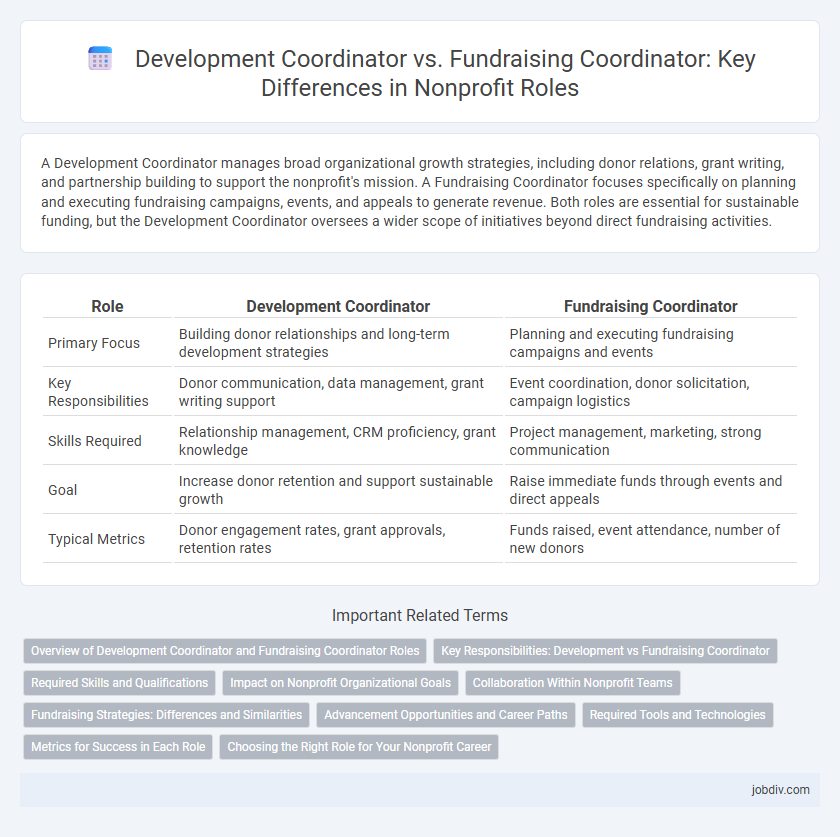A Development Coordinator manages broad organizational growth strategies, including donor relations, grant writing, and partnership building to support the nonprofit's mission. A Fundraising Coordinator focuses specifically on planning and executing fundraising campaigns, events, and appeals to generate revenue. Both roles are essential for sustainable funding, but the Development Coordinator oversees a wider scope of initiatives beyond direct fundraising activities.
Table of Comparison
| Role | Development Coordinator | Fundraising Coordinator |
|---|---|---|
| Primary Focus | Building donor relationships and long-term development strategies | Planning and executing fundraising campaigns and events |
| Key Responsibilities | Donor communication, data management, grant writing support | Event coordination, donor solicitation, campaign logistics |
| Skills Required | Relationship management, CRM proficiency, grant knowledge | Project management, marketing, strong communication |
| Goal | Increase donor retention and support sustainable growth | Raise immediate funds through events and direct appeals |
| Typical Metrics | Donor engagement rates, grant approvals, retention rates | Funds raised, event attendance, number of new donors |
Overview of Development Coordinator and Fundraising Coordinator Roles
Development Coordinators manage comprehensive strategies to enhance nonprofit growth through donor relations, grant writing, and community engagement, ensuring sustainable funding streams. Fundraising Coordinators specialize in planning and executing campaigns, events, and donor outreach specifically aimed at securing immediate financial support. Both roles collaborate closely to align fundraising initiatives with broader organizational development goals, maximizing resource acquisition and impact.
Key Responsibilities: Development vs Fundraising Coordinator
The Development Coordinator focuses on managing donor relationships, overseeing grant applications, and strategizing long-term fundraising plans to support organizational growth. The Fundraising Coordinator primarily handles event planning, donor engagement activities, and the execution of individual fundraising campaigns to meet immediate financial goals. Both roles require strong communication skills and collaboration with volunteers, but the Development Coordinator emphasizes strategic development while the Fundraising Coordinator concentrates on hands-on fundraising efforts.
Required Skills and Qualifications
Development Coordinators require strong project management skills, proficiency in donor database software, and expertise in strategic planning to coordinate fundraising campaigns and outreach programs effectively. Fundraising Coordinators must excel in communication, relationship-building, and event planning, alongside knowledge of grant writing and donor engagement techniques. Both roles demand a deep understanding of nonprofit operations, budgeting, and the ability to analyze fundraising metrics to optimize resource allocation.
Impact on Nonprofit Organizational Goals
Development Coordinators strategically manage donor relationships and long-term funding plans, directly enhancing the nonprofit's capacity to sustain and expand programs. Fundraising Coordinators execute targeted campaigns and events that generate immediate revenue, supporting operational needs and short-term project goals. Together, their coordinated efforts drive comprehensive financial growth, aligning resource acquisition with the nonprofit's mission and strategic objectives.
Collaboration Within Nonprofit Teams
Development Coordinators and Fundraising Coordinators collaborate closely to align strategic goals and maximize resource acquisition for nonprofit organizations. Development Coordinators focus on long-term sustainability by cultivating donor relationships and overseeing grant writing, while Fundraising Coordinators manage event planning and direct fundraising campaigns to drive immediate revenue. Their teamwork enhances communication between marketing, finance, and program departments, ensuring cohesive efforts in donor engagement and mission support.
Fundraising Strategies: Differences and Similarities
Development Coordinators primarily design and implement comprehensive fundraising strategies that include donor relations, grant writing, and event planning to cultivate long-term financial support. Fundraising Coordinators focus more specifically on executing campaigns and managing day-to-day fundraising activities, often coordinating volunteers and donor communications. Both roles collaborate closely to optimize fundraising efforts, though Development Coordinators typically engage in strategic planning while Fundraising Coordinators handle operational tasks.
Advancement Opportunities and Career Paths
Development Coordinators often progress into roles such as Development Manager or Director of Development, focusing on broader strategic planning and donor relationship management within nonprofit organizations. Fundraising Coordinators typically advance toward positions like Fundraising Manager or Campaign Director, emphasizing campaign execution and revenue generation. Both pathways offer opportunities for leadership roles in nonprofit advancement, with Development Coordinators leaning more toward long-term growth strategies and Fundraising Coordinators specializing in targeted fundraising initiatives.
Required Tools and Technologies
Development Coordinators typically utilize donor management software such as Blackbaud and Salesforce to track relationships and contributions, alongside project management tools like Trello or Asana to oversee campaigns. Fundraising Coordinators rely heavily on online fundraising platforms like GoFundMe and Classy, combined with email marketing tools such as Mailchimp to engage donors and promote events. Both roles require proficiency in data analysis software for reporting impact and CRM systems to maintain donor databases efficiently.
Metrics for Success in Each Role
Development Coordinators measure success by tracking donor retention rates, the growth of major gift portfolios, and the increase in unrestricted funding. Fundraising Coordinators focus on metrics such as total funds raised during campaigns, the number of new donor acquisitions, and the efficiency ratio of fundraising expenses to revenue. Both roles prioritize data-driven strategies to enhance nonprofit financial sustainability and stakeholder engagement.
Choosing the Right Role for Your Nonprofit Career
Development Coordinators focus on strategic growth, donor relationships, and long-term organizational sustainability, whereas Fundraising Coordinators specialize in executing specific fundraising campaigns, event planning, and immediate revenue generation. Choosing the right role depends on your career goals, whether you prefer building comprehensive development plans or managing tactical fundraising initiatives. Understanding job responsibilities and required skills helps align your strengths with the nonprofit's mission and growth objectives.
Development Coordinator vs Fundraising Coordinator Infographic

 jobdiv.com
jobdiv.com